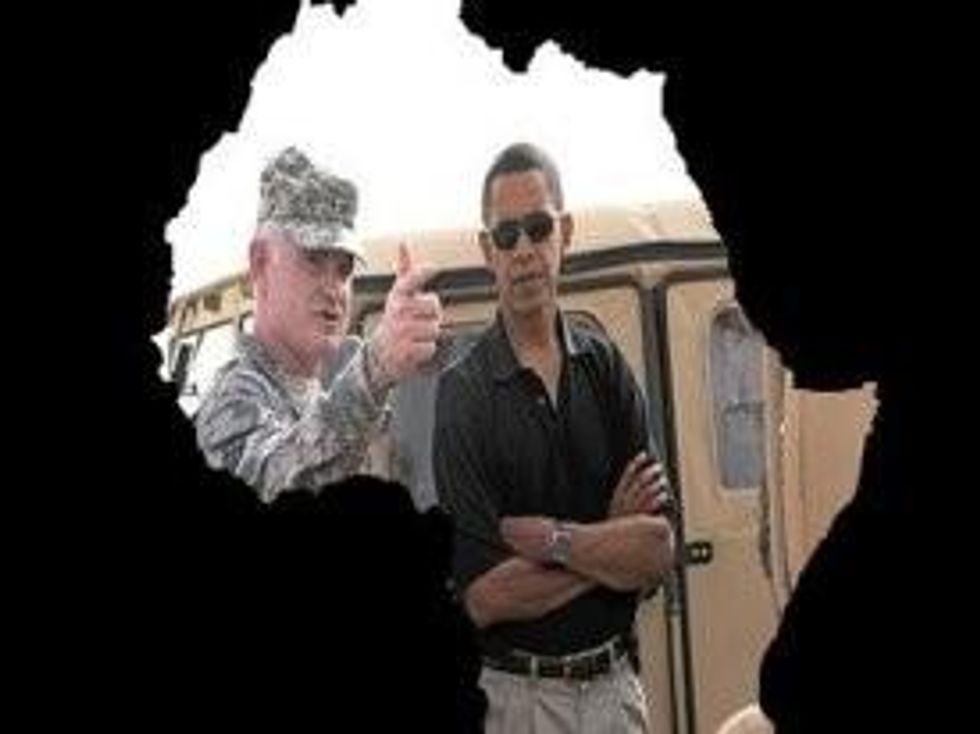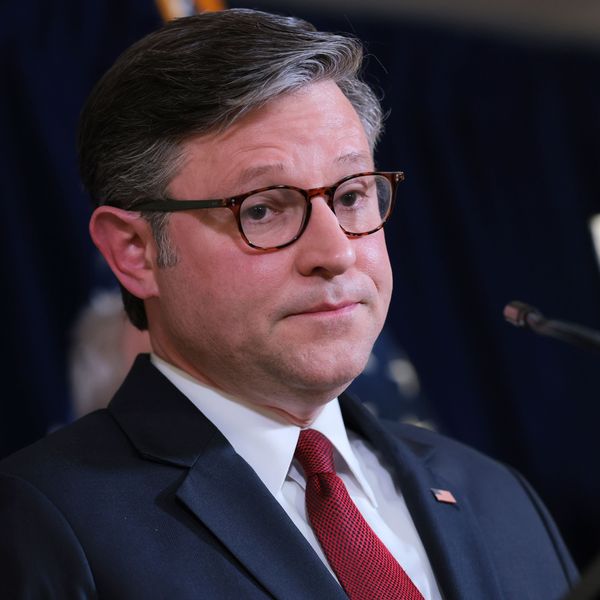The Obamas Do Africa
The President and his family are spending a week in sub-Saharan Africa, with Senegal, Tanzania and South Africa on the itinerary. The focus of the trip, if you believe the White House, is trade, an arena in which the United States has been eclipsed by China since 2009. China, by some measurements, now does nearly twice as much business with Africa as the U.S., and the gap is growing. It is now commonly accepted that the Chinese offer far better terms of trade and investment than the Americans, that they create more jobs for Africans, and their investments leave behind infrastructure that can enrich their African trading partners in the long haul.

No one expects Obama to offer anything on this trip that will reverse America's declining share of the African market. That's because the U.S. is not in the business of fair and mutually beneficial trade - it's about the business of imperialism, which is another matter, entirely. The Americans ensure their access to African natural resources through the barrel of a gun.
So, while the Chinese and Indians and Brazilians and other economic powerhouses play by the rules of give and take, the U.S. tightens its military grip on the continent through its ever-expanding military command, AFRICOM.
To justify its rapid militarization of Africa, Washington plunges whole regions of the continent into chaos. U.S. policies, under presidents Clinton, Bush and Obama, have utterly destroyed Somalia, made the Horn of Africa a theater of war, drawn the northern tier of the continent into America's cauldron of terror, and killed six million people in the eastern Congo.
The face of America in Africa is war, not trade; extraction of minerals by military intimidation, not conventional commerce. Washington's priority is to embed AFRICOM ever deeper into the militaries of African states - rather than configuring more favorable trade relationships on the continent. But you won't learn that from the U.S. corporate media, which chooses to focus on the $100 million cost of Obama's African trip, or to look for human interest angles on Obama's decision not to touch down in his father's homeland, Kenya. However, even that angle is too sinister for deeper exploration by the corporate press, because Kenya's absence from the itinerary is meant as a threat.
The United States is angry because Washington wanted the Kenyan people to elect a different president, one more acceptable to U.S. policymakers. The Americans expected the whole of Kenyan civil society to bend to Washington's will, and reject the candidacy of Uhuru Kenyatta, simply to please the superpower. When that didn't happen, it was decided that Kenya must be shunned, despite its past services to U.S. imperialism.
Skipping Kenya was a warning that more serious repercussions may lurk in the future - which is a potent threat, because the U.S. controls most of the guns of Africa. As the U.S.-backed warlord in Somalia said in Jeremy Scahill's excellent film The Dirty War, "The Americans are masters of war." War, and the threat of war, is the reality behind every U.S. presidential visit, to Africa and everywhere else. Whether the terms of trade are good or bad, the declining U.S. empire will get access to the resources it needs, or thousands - millions! - will die.
An Urgent Message From Our Co-Founder
Dear Common Dreams reader, The U.S. is on a fast track to authoritarianism like nothing I've ever seen. Meanwhile, corporate news outlets are utterly capitulating to Trump, twisting their coverage to avoid drawing his ire while lining up to stuff cash in his pockets. That's why I believe that Common Dreams is doing the best and most consequential reporting that we've ever done. Our small but mighty team is a progressive reporting powerhouse, covering the news every day that the corporate media never will. Our mission has always been simple: To inform. To inspire. And to ignite change for the common good. Now here's the key piece that I want all our readers to understand: None of this would be possible without your financial support. That's not just some fundraising cliche. It's the absolute and literal truth. We don't accept corporate advertising and never will. We don't have a paywall because we don't think people should be blocked from critical news based on their ability to pay. Everything we do is funded by the donations of readers like you. Will you donate now to help power the nonprofit, independent reporting of Common Dreams? Thank you for being a vital member of our community. Together, we can keep independent journalism alive when it’s needed most. - Craig Brown, Co-founder |
The President and his family are spending a week in sub-Saharan Africa, with Senegal, Tanzania and South Africa on the itinerary. The focus of the trip, if you believe the White House, is trade, an arena in which the United States has been eclipsed by China since 2009. China, by some measurements, now does nearly twice as much business with Africa as the U.S., and the gap is growing. It is now commonly accepted that the Chinese offer far better terms of trade and investment than the Americans, that they create more jobs for Africans, and their investments leave behind infrastructure that can enrich their African trading partners in the long haul.

No one expects Obama to offer anything on this trip that will reverse America's declining share of the African market. That's because the U.S. is not in the business of fair and mutually beneficial trade - it's about the business of imperialism, which is another matter, entirely. The Americans ensure their access to African natural resources through the barrel of a gun.
So, while the Chinese and Indians and Brazilians and other economic powerhouses play by the rules of give and take, the U.S. tightens its military grip on the continent through its ever-expanding military command, AFRICOM.
To justify its rapid militarization of Africa, Washington plunges whole regions of the continent into chaos. U.S. policies, under presidents Clinton, Bush and Obama, have utterly destroyed Somalia, made the Horn of Africa a theater of war, drawn the northern tier of the continent into America's cauldron of terror, and killed six million people in the eastern Congo.
The face of America in Africa is war, not trade; extraction of minerals by military intimidation, not conventional commerce. Washington's priority is to embed AFRICOM ever deeper into the militaries of African states - rather than configuring more favorable trade relationships on the continent. But you won't learn that from the U.S. corporate media, which chooses to focus on the $100 million cost of Obama's African trip, or to look for human interest angles on Obama's decision not to touch down in his father's homeland, Kenya. However, even that angle is too sinister for deeper exploration by the corporate press, because Kenya's absence from the itinerary is meant as a threat.
The United States is angry because Washington wanted the Kenyan people to elect a different president, one more acceptable to U.S. policymakers. The Americans expected the whole of Kenyan civil society to bend to Washington's will, and reject the candidacy of Uhuru Kenyatta, simply to please the superpower. When that didn't happen, it was decided that Kenya must be shunned, despite its past services to U.S. imperialism.
Skipping Kenya was a warning that more serious repercussions may lurk in the future - which is a potent threat, because the U.S. controls most of the guns of Africa. As the U.S.-backed warlord in Somalia said in Jeremy Scahill's excellent film The Dirty War, "The Americans are masters of war." War, and the threat of war, is the reality behind every U.S. presidential visit, to Africa and everywhere else. Whether the terms of trade are good or bad, the declining U.S. empire will get access to the resources it needs, or thousands - millions! - will die.
The President and his family are spending a week in sub-Saharan Africa, with Senegal, Tanzania and South Africa on the itinerary. The focus of the trip, if you believe the White House, is trade, an arena in which the United States has been eclipsed by China since 2009. China, by some measurements, now does nearly twice as much business with Africa as the U.S., and the gap is growing. It is now commonly accepted that the Chinese offer far better terms of trade and investment than the Americans, that they create more jobs for Africans, and their investments leave behind infrastructure that can enrich their African trading partners in the long haul.

No one expects Obama to offer anything on this trip that will reverse America's declining share of the African market. That's because the U.S. is not in the business of fair and mutually beneficial trade - it's about the business of imperialism, which is another matter, entirely. The Americans ensure their access to African natural resources through the barrel of a gun.
So, while the Chinese and Indians and Brazilians and other economic powerhouses play by the rules of give and take, the U.S. tightens its military grip on the continent through its ever-expanding military command, AFRICOM.
To justify its rapid militarization of Africa, Washington plunges whole regions of the continent into chaos. U.S. policies, under presidents Clinton, Bush and Obama, have utterly destroyed Somalia, made the Horn of Africa a theater of war, drawn the northern tier of the continent into America's cauldron of terror, and killed six million people in the eastern Congo.
The face of America in Africa is war, not trade; extraction of minerals by military intimidation, not conventional commerce. Washington's priority is to embed AFRICOM ever deeper into the militaries of African states - rather than configuring more favorable trade relationships on the continent. But you won't learn that from the U.S. corporate media, which chooses to focus on the $100 million cost of Obama's African trip, or to look for human interest angles on Obama's decision not to touch down in his father's homeland, Kenya. However, even that angle is too sinister for deeper exploration by the corporate press, because Kenya's absence from the itinerary is meant as a threat.
The United States is angry because Washington wanted the Kenyan people to elect a different president, one more acceptable to U.S. policymakers. The Americans expected the whole of Kenyan civil society to bend to Washington's will, and reject the candidacy of Uhuru Kenyatta, simply to please the superpower. When that didn't happen, it was decided that Kenya must be shunned, despite its past services to U.S. imperialism.
Skipping Kenya was a warning that more serious repercussions may lurk in the future - which is a potent threat, because the U.S. controls most of the guns of Africa. As the U.S.-backed warlord in Somalia said in Jeremy Scahill's excellent film The Dirty War, "The Americans are masters of war." War, and the threat of war, is the reality behind every U.S. presidential visit, to Africa and everywhere else. Whether the terms of trade are good or bad, the declining U.S. empire will get access to the resources it needs, or thousands - millions! - will die.

